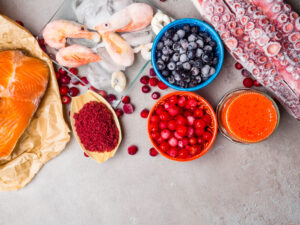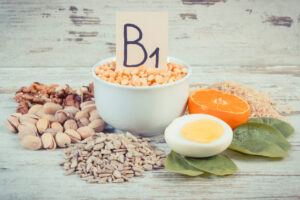Dear Annie, I wanted to share a memory-strengthening strategy with you. About 20 years ago (I’m 72) I started noticing my memory beginning to weaken, and asked my friend, an expert in alternative remedies, what I should start taking.
Long story short, I’ve been taking 12 mg of BioAstin (astaxanthin) and a tablet of Lipothiamine (originally once a day and now twice a day for both) and my memory has become sharper and sharper again.
It is better now than when I was 40!
WOW, Thanks for sharing. Let’s take a dive into these supplements to explore what they are and how they work.
About Astaxanthin
Astaxanthin is a naturally occurring carotenoid found mainly in marine plants and animals. Carotenoids are yellow, orange, and red pigments responsible for these colors in the natural world. They make the colors of pumpkins, squash, salmon, crab, carrots, tomatoes and even flamingos.

Carotenoids can also be found in several bacteria, and fungi. Astaxanthin has a strong blood red pigment and is considered by many to be one of the most powerful antioxidants.
Astaxanthin as a Nutritional Supplement
This is an interesting, and relatively new healing agent, at least in its concentrated form as a nutritional supplement. Astaxanthin was discovered in 1938 by German scientist Richard Kuhn. In 1987 astaxanthin was approved as an additive to fish and animal foods to help stabilize the coloring in farming fish markets. Finally, the FDA approved its use as a dietary supplement in 1995.
As a nutritional supplement for humans and animals, astaxanthin is primarily extracted from the green, fresh water, microalgae Haematococcus pluvialis. Although it is also produced from other marine and plant life, H pluvialis is throught to be the most biologically sustainable source, with the highest known concentration of the blood red carotenoid. Some producers create synthetic astaxanthin (although not usually used for human supplementation). Because pigment sources can vary, it is a good idea to read the label carefully to insure you are ingesting a quality product.
Some of the best dietary sources of astaxanthin include algae, yeast, salmon, trout, krill, shrimp, and crayfish.
A Strong Antioxidant
The numbers vary by researchers and producers, but overall, it is universally accepted that astaxanthin is a powerful antioxidant; in fact, it is more powerful than both vitamins E and C. It should also be noted that while there are many studies about the possible benefits of this supplement, there is a notable lack of human studies, probably because it’s relatively new to the scene.
Astaxanthin-Medicinal Application
When used as a healing agent astaxanthin is used as an antioxidant to support healthy cell activity, prevent cell damage, and to remove unhealthy cells and cell growth. It is used to prevent and treat cancer, diabetes, cardiovascular disease, high blood pressure, neurodegenerative disorders, improve memory, prevent, or slow aging, stimulate the immune system, as a treatment for peripheral neuropathy, as an anti-inflammatory, to improve eyesight, encourage healthy skin and more.
Dosage Recommendations
Astaxanthin is fat soluble and so is best absorbed with dietary oils such as fish oil, omega-3 oil or rich seeds like chia, flaxseed, walnuts, and almonds. The recommended dose is 2-4 mg 2 or 3 times per day.
Contra-indications
Astaxanthin is generally considered safe. However, the Natural Medicine Journal listed the following possible side effects, warnings, and interactions for the supplement:
- May increase bleeding – Use with caution if you have a bleeding disorder or are taking medicines that effect bleeding, most often dose adjustments are necessary.
- May lower blood sugar levels – caution is therefore advised for those taking medicines for diabetes or those with hypoglycemia.
- Can lower blood pressure, talk with your doctor if you’re already on medicines to lower your blood pressure or have low blood pressure.
- Use cautiously with those that are on immunosuppressive therapies.
- Excessive doses can cause skin to redden.
- Talk to your Dr if your taking 5-alpha-reductase inhibitors. These are a group of drugs used to treat enlargement of the prostate (benign prostatic hyperplasia) and male pattern hair loss.
About Lipothiamine
Lipothiamine is a synthetic, fat-soluble form of vitamin B-1 (thiamine). Because it is fat soluble, lipothiamine is easily absorbed by the body. This form of thiamine is able to cross the blood-brain barrier to impact neurotransmitters in the brain, helping to improve memory, mood, and focus.
The body does not produce thiamine on its own. We must get it from our diet. Further, thiamine levels are easily depleted because food-based thiamine is water soluble and used quickly.

Poor dietary choices like too much coffee and tea, alcohol, and empty calories (foods with little to no nutritional value) and an overabundance of highly processed grains, lack or can deplete thiamine levels more quickly. In 1936 scientists developed a synthetic form of thiamine that was fat soluble that would stay in a person’s system longer with more stability.
Some food sources of thiamine include beef, brewer’s yeast, legumes (beans, lentils), milk, nuts, oats, oranges, pork, rice, seeds, wheat, whole-grain cereals, and yeast.
What Thiamine does in the body
- Thiamine (B-1) is essential for proper neural and brain function.
- It maintains heart health and is used by the body to convert food into energy.
- Vitamin B-1 contributes to the development of myelin sheaths. These are protective coverings which wrap around neurons to protect them from damage.
- It plays an important role in the production the neurotransmitter Acetylcholine (ACh). ACh relays messages between neurons and the brain and is critical for cognition, learning and memory.
- Helps the body deal with stress and uplifts mood.
- May help relieve or prevent neuropathy because of its protective action on nerve tissue and the myelin sheaths.
What Low Thiamine looks like
It is not uncommon to have low thiamine in the system. Some of the symptoms for a moderate deficiency include a loss of appetite, fatigue, malaise, or a general ache feeling where you just don’t feel good but have trouble identifying the cause. Moderately low thiamine is connected to muscle weakness, tingling in the arms and legs, a change in heart rate, shortness of breath, blurry vision, and difficulty with mood.
Beriberi is a condition caused by severe thiamine deficiency. Beriberi is a heart and nerve disease that can appear in a variety of forms. Here is the link to a good website for more information about beriberi, it’s history and modern manifestations. More about Bariberi.
Contra-indications and side effects
Lipothiamine is considered generally safe with few to no side effects. According to the National Health Institute, there have been very few side effects reported to supplements of 50 mg or more per day. They hypothesize this is because the body only absorbs about 5 mg per day and flushes the excess quickly. However, excessive doses of thiamine for extended periods can produce symptoms such as sensations of warms, sweating, itching, discoloration of skin and other allergic reactions.
There could be some interactions and contra-indications for those taking Dilantin, Digoxin, or diuretics. If this is you, please talk to your doctor before taking lipothiamine.
Learn More
References
https://www.webmd.com/vitamins/ai/ingredientmono-1063/astaxanthin
https://en.wikipedia.org/wiki/Astaxanthin
https://www.ncbi.nlm.nih.gov/pmc/articles/PMC3917265/
https://www.ncbi.nlm.nih.gov/pmc/articles/PMC5946307/
https://nootriment.com/astaxanthin-dosage/
https://www.patientslikeme.com/treatments/detail/lipothiamine
https://ods.od.nih.gov/factsheets/Thiamin-HealthProfessional/
https://community.bulksupplements.com/vitamin-b1-thiamine/
https://www.mayoclinic.org/drugs-supplements-thiamin/art-20366430
Disclaimer
The statements and ideas presented here are not intended to diagnose, treat, cure, or prevent any disease or condition. They have not been evaluated by the FDA. All ideas presented are for the sole purpose of education. To help you take control of your own health. If you have a health concern or condition, consult a physician. We suggest that you always consult a medical doctor before modifying your diet, using any new product, drug, supplement, or doing any new exercises.
These statements and products have not been evaluated by the FDA. They are not intended to diagnose, treat, cure, or prevent any disease or condition. If you have a health concern or condition, consult a physician. Always consult a medical doctor before modifying your diet, using any new product, drug, supplement, or doing any new exercises.
Herbs taken for health purposes should be treated with the same care as medicine. Herbal remedies are no substitute for a healthy diet and lifestyle. If you are serious about good health, you’ll want to combine diet, exercise, herbals, a good relationship with your doctor and a generally healthy lifestyle. No one of these will do it alone.
This information is designed to be used as part of a complete health plan. No products are intended to replace your doctor’s care, or to supersede any of his/her advice or prescriptions.





